|
Railplitting Festival remembers our
history with Abraham Lincoln and the christening of the city of
Lincoln
 Send a link to a friend
Send a link to a friend
[September 27, 2021]
The city of Lincoln was incorporated on Monday,
August 22, 1853. The town was named after Abraham Lincoln, then a
local attorney and surveyor who had platted Logan County and named
the county after a dear friend John Logan.
|
|
 A week later, the first lots were sold costing
between $40 and $150. Lincoln grabbed a couple of watermelons from a
nearby wagon and asked the proprietors to join him in christening
the city. The actual christening took place on property that is now
the Logan County Tourism Bureau Lincoln Depot Visitors Center and
Amtrak wait station downtown. A week later, the first lots were sold costing
between $40 and $150. Lincoln grabbed a couple of watermelons from a
nearby wagon and asked the proprietors to join him in christening
the city. The actual christening took place on property that is now
the Logan County Tourism Bureau Lincoln Depot Visitors Center and
Amtrak wait station downtown.
At that time, Abraham Lincoln was a circuit riding attorney who
practiced law at the Postville Courthouse, had been a surveyor for
the state, and the private representation of the Chicago and Alton
Railroad that had plans to construct a rail line that would pass
close by but not through Postville. The town of Lincoln was formed
to address the water need of steam locomotives every few miles.

Each year since its inception, the National Railsplitting Festival
has included a re-enactment of that christening as part of the
Sunday activities. Lincoln Mayor Tracy Welch read the narrative.
The role of Robert Latham was played by Geoff Ladd. Daris Knauer,
who has been involved in the re-enactment for the past 50 years,
played Virgil Hickox. Marvin Bartman assumed the role of John D.
Gillette. The Stevens boy was played by Roan Norin and Gary Simpkins
took on the persona of Abraham Lincoln.
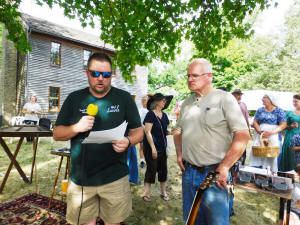
Welch read the script as the actors filled their roles.
Ladies and gentlemen, it is with pride and
dignity that the Railsplitting Festival presents the re-creation of
the history making event of August 27, 1853 – the christening of the
new town of Lincoln, Illinoi.
Lots were being sold for a new town along the Chicago and Alton
right of way. Present were prominent persons of the day and
significant characters of American history.
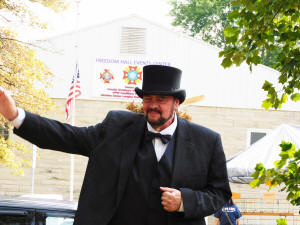
Robert Latham
Latham was an early and strong supporter of Abraham Lincoln in his
political life. Latham was one of the three corporate founders of
the town of Lincoln.

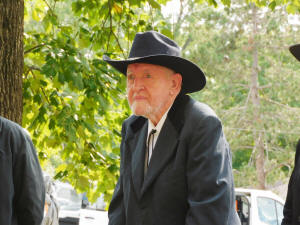
Virgil Hickox
A director of the railroad who had gone through the planning
sessions including establishment of a corporation to bring into
existence the new town and make it the county seat.
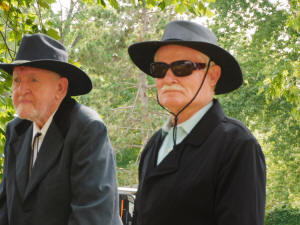
John D. Gillette
He came to Logan County in 1838 from
Connecticut and was a close personal friend of Abraham Lincoln, as
was (Gillette’s) son in law, Governor Richard J. Oglesby. He helped
to develop the political career of Lincoln the circuit rider.
Each of these men had purchased section of land along the right of
way.

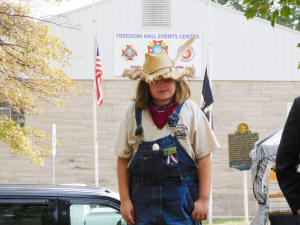
The Stevens boy
The young lad witnessed the historic event.
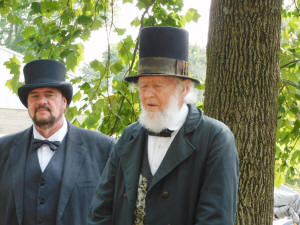
Abraham Lincoln
At that time, their friend, 44 year-old circuit riding lawyer
Abraham Lincoln, was chosen as their legal advisor. The men chose
the name ‘Lincoln’ for the name of their new town and asked Abe to
christen it for them.
[to top of second column] |

At the noon hour, Abe bought
a watermelon and cut it into two, giving a part to Latham, Gillett
and Hickox while keeping a part. Squeezing the juice from the heart
of the melon he said “We will now christen the new town Lincoln.”
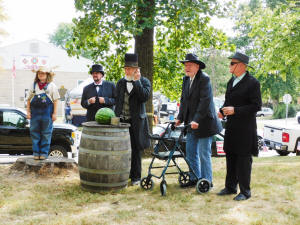
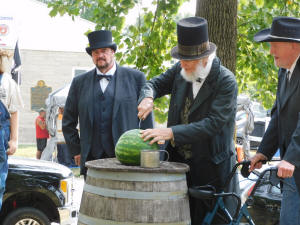
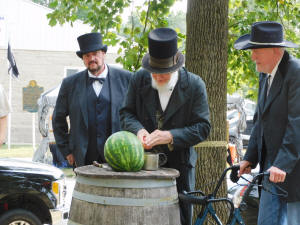
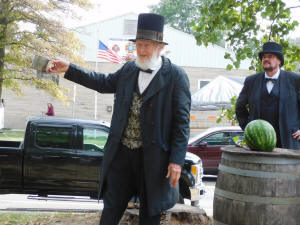

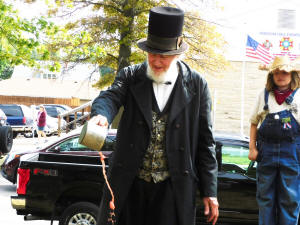
Thus Lincoln, Illinois is the only city in
the world named for and christened Abraham Lincoln before he became
famous.
Seven years later, in 1860 Abraham Lincoln was elected the 16th
President of the United States. Although his mortal remains are
interred in Springfield – the spirit of Abraham Lincoln lives today
and always in his namesake city.
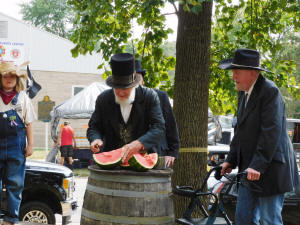
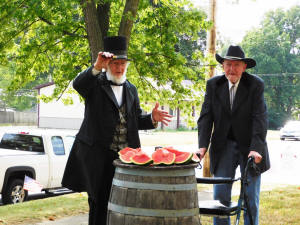

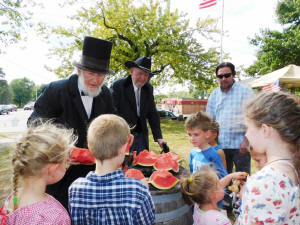
After the christening reenactment on Sunday, Lincoln cut up the
portion of the watermelon he had not placed his hand inside and
invited the youngsters watching to come grab a piece if they so
desired. There was a rush to the watermelon as several kids wanted
to do just that.
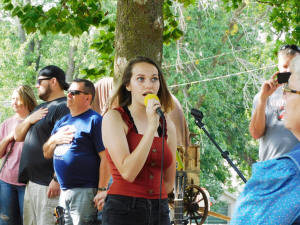
The ceremony came to its official end with Kaylee Ingram singing the
National Anthem.
[Nila Smith]
 |